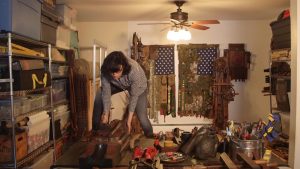Finding Sara Rahbar
Description
Sara Rahbar has spent a lifetime looking for the antidote to her existential angst, only to find it in her own work.
Featured Artists

Sara Rahbar is an admired mixed media artist whose work is in the permanent collections of the Centre Pompidou, the British Museum, and other major museums.
Born in Tehran in 1976, Rahbar left Iran with her family at age 6. She studied at the Fashion Institute of Technology in New York and Central Saint Martins College of Art and Design in London.
Constructed using various found and collected objects and fabrics, her work has been exhibited at the Queensland Museum, the Museum of Art and Design in New York, the Royal Museums of Fine Arts of Belgium, London’s Saatchi Gallery, and other institutions around the world. Beginning in 2005, she created a series of mixed media artworks based on the United States flag, examining issues of American militarism and identity. Her later War Series featured three-dimensional pieces incorporating helmets, prosthetics, and other objects of war.
Transcript
Sara Rahbar’s approach to both her life and her art is bold.
Sara Rahbar: Honestly, if I was gonna think things out, I wouldn’t do anything. I just jump in.
She finally succumbed to becoming an artist at the dawn of her 30s, after years of trying and failing to find another satisfying career. A decade later, the mostly self-taught mixed media artist has had her work shown at the Pompidou Centre in Paris and London’s Saatchi Gallery and the British Museum. Self-trust remains at the heart of her entirely intuitive practice.
Rahbar: I can’t try. If I feel like I’m trying, I need to leave it alone and come back tomorrow. I’m very clear that that ruins everything.
But though she’s not one for planning, patterns still do emerge in Rahbar’s work. The theme of belonging comes up often—not because she craves it, but because she doesn’t understand other people’s obsession with it.
Rahbar: I never needed to belong to something, so I think that’s why. I noticed that was existing around me, so I was always questioning it. My whole work has been about trying to understand that need, to have to belong to someone, to something, to a nationality, to a religion. I’m good with not knowing. I have no idea where I’m going, and I have no idea why any of us are here. And I’m okay with not knowing, but I don’t wanna make up a story to give myself a feeling of security while I’m here.
Still, Rahbar does know where she comes from, though she has little interest in the label “Iranian American.” She was born in Tehran in 1976. Her family fled the Iranian Revolution when she was six. She returned, for the first time, in her early 20s, tagging along as the photographer for a friend’s documentary project.
Rahbar: So, I just bought a camera and went. And I don’t know why. I did not know how to use a digital camera. And I learned how to use it on the plane, read the manual, and I took a lot of awful photos, and just learned while doing it. Once the film was done, it was me and the camera. And I hadn’t left Iran yet. And a lot of things were proving to be very challenging. I was someone in public, I was someone with my family, I was someone in private life. I was constantly going through all these personality changes, because you couldn’t fully be all the things that you are in one place. There was a lot of covering up. I almost feel like I went into the studio and just put on all these layers, and all these costumes, and photographed myself. And it was, like, a scream. I don’t know. It was like a release. I didn’t really know what I was doing, and I didn’t really think, “This is art.” I just needed to do it. And once I left Iran, I came back to the States. I never touched a camera again. So, I think that was something that was very situational that happened. And that series was about a lot of love and frustration.
Over the years, Sara Rahbar has used textiles, wood, and found objects in her work. But today, her favorite material is the strongest she could find: bronze. The series, Confessions, freezes Rahbar’s own tense gestures for the ages.
Rahbar: I just have this angst. I mean, it’s getting better, but I’m not comfortable in my skin all the time. I wake up just like that. My whole life has been a process of, “How do I deal with what’s happening inside my brain? What do I do with this?” And I think the only thing I found is that I continue to work.

